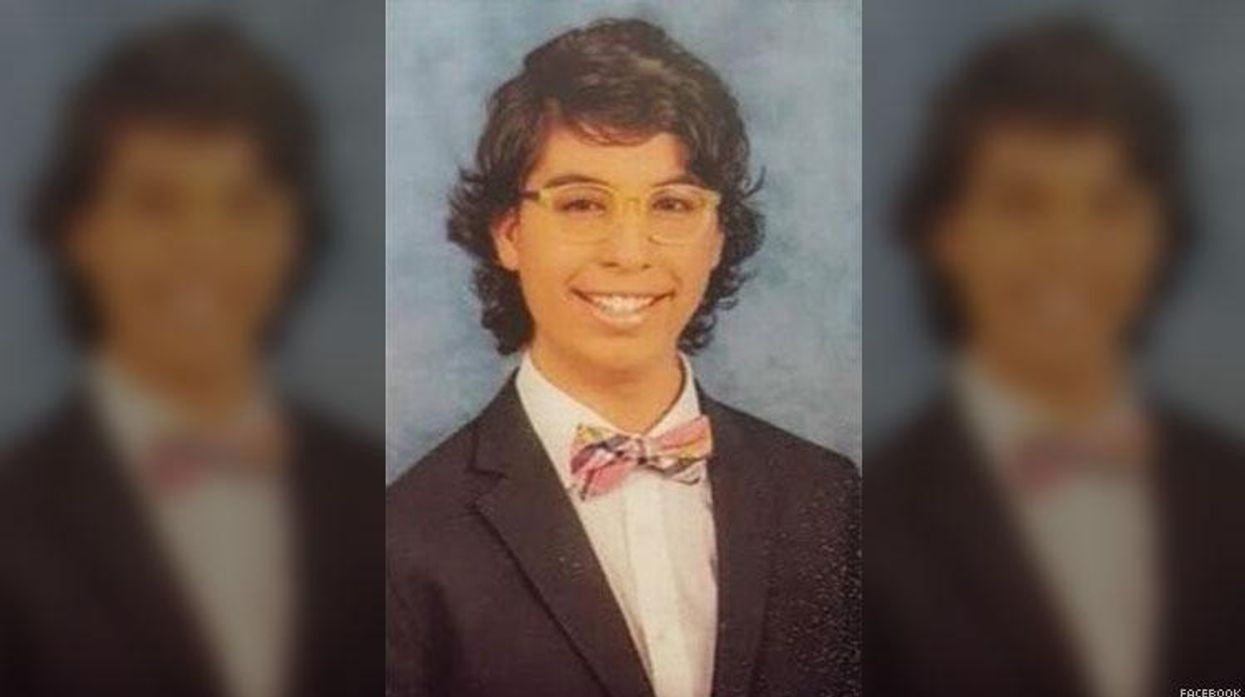The mother of a transgender Miami teen who recently took her own life is sharing her daughter's story as a means of promoting love and acceptance.
"I would want [people] to know to open their hearts, minds and souls to accepting this unique situation that their son or daughter may be expressing and experiencing -- because it would be the biggest gift they could give," Patricia McKay Verbeeck told the Miami Herald this week. "It's not about money or the next gadget, but to accept, love and embrace who your son or daughter is telling you that they are. Expand the space in your heart to support and to provide every possible avenue to them to succeed in their identity."
Verbeeck's transgender daughter died by suicide March 6, a little over a month before her 18th birthday. Her parents took out a large paid obituary notice in the Herald, and her mother later spoke to a reporter about the importance of her story. The obit refers to the teen by her birth name, Eric Peter Verbeeck, as that is how most people knew her, Patricia Verbeeck told the Herald, but she was adopting the new name of Hope, intending to use it after graduating from high school in June. She was an A student who loved theater and had already been accepted by 11 colleges, intending to study theater and arts management, and was open about her gender identity in interviews with college admissions personnel.
"While Eric lived life to the fullest, he had his own personal struggle," reads the obit, using male pronouns. "He was in the process of transitioning to his identity as a girl. It simply became too much for him and he sought relief from his suffering. He left a beautiful letter letting his parents know that he knew he had been loved unconditionally, but he needed to move on."
In the letter, the teen wrote, "I would like to be remembered as a transgender pansexual teenage girl named Hope. Being transgender is my gender identity. My sexual orientation, or sexual identity, is being pansexual, meaning that I do not care about what the person is; I care about who they are. Sexual orientation is who you go to bed with and gender identity is who you go to bed as."
Eric/Hope had the full acceptance of her parents, Patricia Verbeeck said, although they are separated. A little over a year ago, she came out to her mother. She said, "'I feel like I'm in a box, I am in the wrong place,'" Verbeeck recalled. "I knew some information about transgender issues. I wasn't totally uninformed. I said, 'Eric, what is the next step you would like to take on transitioning from a boy to a girl?' I said, 'I don't want to tell you what to do or think you should do. You tell me the journey you want to take.'"
They went on to meet with a team of transition specialists in the University of Miami's health care facilities. Hope went on hormone therapy and made plans for surgery. No one, including the psychologist she was seeing, thought she was likely to take her life. But the night before she died, she had another serious conversation with her mother.
"The last night of his life I lay in bed with him," Verbeeck, who still uses male pronouns for her child, although she had been gradually changing to female ones. "We would always talk, and that last night he said again, 'I feel trapped. This is not happening enough for me.'
"I said, 'We're pushing this as fast as we can. If I could pull a rabbit out of a hat and have you wake up as your ideal girl, I would do it.' I said, 'It will be long and hard and you're only 17 but in the next 14 months we would do the surgery, we would do the checkups, we're going to set the date.'"
"This was an issue that he suffered with even though he was unlike many of the teens who get no support and who don't have anybody helping them," Verbeeck continued. "He had everything. Both of his parents supported the transition. This was going to become an ongoing passion of him going to college, to join a group, and to get the message out."
The message, she said, is this: "Do not slam the door on your son or your daughter if they come and express a sexual identity issue. Do not slam that door. Thank God I didn't. He did it anyway. But what if I had slammed that door? I would not be able to live with myself."
If you are a trans or gender-nonconforming person considering suicide, Trans Lifeline can be reached at (877) 565-8860. LGBT youth (ages 24 and younger) can reach the Trevor Project Lifeline at (866) 488-7386. The National Suicide Prevention Lifeline at (800) 273-8255 can also be reached 24 hours a day by people of all ages and identities.




































































Charlie Kirk DID say stoning gay people was the 'perfect law' — and these other heinous quotes